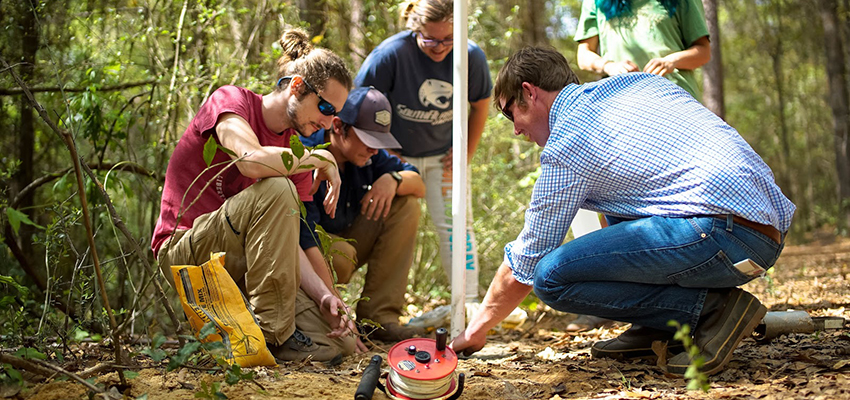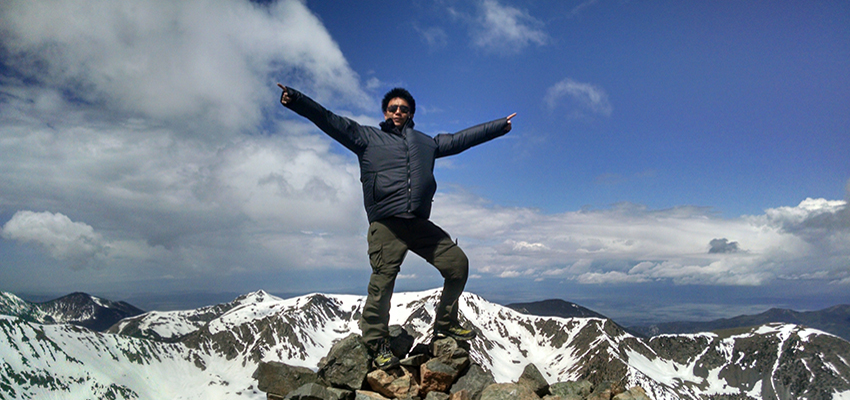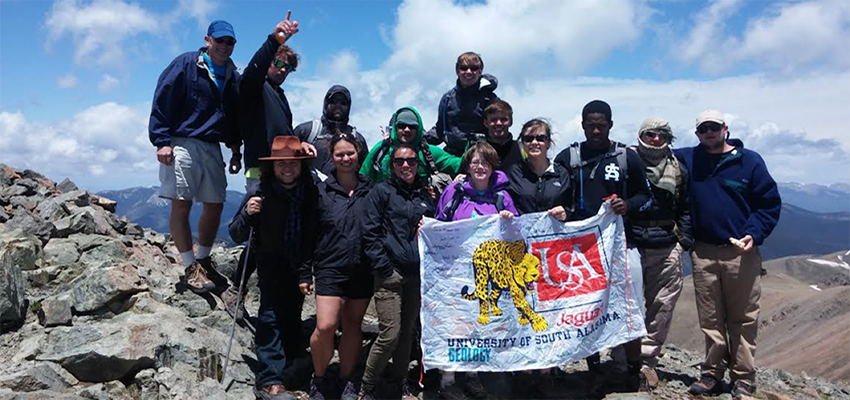Bachelor of Science in Geology
What is Geology?
Students in the Bachelor of Science in Geology degree program study Earth’s physical, chemical, and biological features and evolution over a wide range of spatial and temporal scales. A geology major’s education encompasses a broad spectrum of studies and draws from all the basic sciences: chemistry, physics and biology. The geology program at South is justifiably well known for its integration of education and research opportunities for students.
Why Geology at South?
Geology course sizes at South are small, which allows faculty to provide individualized attention. Students who major in geology receive extensive hands-on training through multiple field trips and research opportunities conducted in diverse geological regions, including Alabama, Texas and New Mexico. Geology courses at South especially take advantage of the University’s close proximity to the Gulf of Mexico, where students can find some of the world's most spectacular modern depositional environments, including Dauphin Island, the Mobile-Tensaw Delta, and Mobile Bay. Several of Geology faculty members conduct research in these areas and undergraduate students are invited to participate with them.
Careers in Geology
The Bachelor of Science in Geology at South prepares students to enter the scientific workforce.
Geologists work in the following fields:
- mining and mineral exploration
- petroleum exploration
- engineering geology
- environmental geology
- research and academia
- hydrology
- volcanology
- seismology
- planetary geology
- paleontology
- remote sensing and geographic information systems
- teaching
- landfill design
- military planning
- urban planning
- hazards mitigation
- police and legal work
- state and federal government
Students in the geology program at South are mentored by experienced faculty advisors and receive personalized advice on seeking geology careers or pursuing graduate research opportunities following graduation. South maintains close contact with alumni who are currently employed as geologists in the mining, petroleum, environmental, water supply and research fields.
For more information on potential careers in geology, please visit the following websites:
Click on the course title to view the course description in the Academic Bulletin. All links open in a new window.
Geology Core Requirements
| Class Number | Course Description | Sem. Hours |
|---|---|---|
| GY 111/111L | Physical Geology | 4 |
| GY 112/112L | Earth History | 4 |
| GY 301 | Geomorphology | 3 |
| GY 302 | Crystallography & Mineralogy | 4 |
| GY 303 | Igneous and Metamorphic Petrology | 4 |
| GY 304 | Stratigraphy (W) | 3 |
| GY 306 | Sedimentology (W) | 3 |
| GY 401 | Invertebrate Paleontology | 3 |
| GY 403 | Structural Geology | 4 |
| GY 480 | Field Geology | 6 |
| 6-8 Hours of Geology Electives | 6-8 | |
| Total Hours: | 44-46 |
Additional Requirements from Other Disciplines
Chemistry
| Class Number | Course Description | Sem. Hours |
|---|---|---|
| CH 131 | General Chemistry I | 3 |
| CH 132 | General Chemistry II | 3 |
Physics*
| Class Number | Course Description | Sem. Hours |
|---|---|---|
| PH 114 | Non-Calculus Based General Physics I | 4 |
| PH 115 | Non-Calculus Based General Physics II ** | 4 |
| PH 201 | Calculus Based General Physics I | 4 |
| PH 202 | Calculus Based General Physics II ** | 4 |
Mathematics***
| Class Number | Course Description | Sem. Hours |
|---|---|---|
| MA 125 | Calculus I | 4 |
| MA 126 | Calculus II | 4 |
(W) - Denotes a writing-intensive course.
* - The Geology degree requires a minimum of 8 hours of Physics (algebra/ trigonometry-based; PH 114 and PH 115), or calculus-based ; PH 201 and PH 202).
** - Students can elect to substitute GY 305 for PH 115/PH 202.
*** - Students can elect to substitute GY 420 for MA 126.
Those intending on pursuing graduate study are encouraged to complete a full year of calculus and physics at the University of South Alabama.
Academic Year 1 (Freshman)
Fall Semester
| Course | Hours |
|---|---|
| CAS 100 | 2 |
| GY 111 | 3 |
| GY 111L | 1 |
| CH 131 | 4 |
| Social Science 1 | 3 |
| EH 101 | 3 |
| Total Hours: | 16 |
Spring Semester
| Course | Hours |
|---|---|
| GY 112 | 3 |
| GY112L | 1 |
| CH132 | 4 |
| MA 125 | 4 |
| EH 102 | 3 |
| Total Hours: | 15 |
Academic Year 2 (Sophomore)
Fall Semester
| Course | Hours |
|---|---|
| GY 301 | 3 |
| GY 302 | 4 |
| MA 126 or GY 420 | 4 |
| Humanities 1 | 4 |
| Total Hours: | 14 |
Spring Semester
| Course | Hours |
|---|---|
| GY 303 | 4 |
| GY 304 | 3 |
| PH 114/201 | 5/4 |
| Social Science 2 | 3 |
| Total Hours: | 14/15 |
Academic Year 3 (Junior)
Fall Semester
| Course | Hours |
|---|---|
| PH 115/202 or GY 305 | 5/4 |
| GY 401 | 3 |
| Humanities 2 | 3 |
| Foreign Lang. 1 | 3 |
| Minor 1 | 3/4 |
| Total Hours: | 16-18 |
Spring Semester
| Course | Hours |
|---|---|
| GY 402 | 3 |
| GY 403 | 4 |
| Humanities 3 | 3 |
| Foreign Lang. 2 | 3 |
| CA 110 | 3 |
| Total Hours: | 15 |
Summer Semester
| Course | Hours |
|---|---|
| GY 480 | 6 |
| Total Hours: | 6 |
Academic Year 4 (Senior)
Fall Semester
| Course | Hours |
|---|---|
| GY Elective 1 | 3/4 |
| Minor 2 | 3/4 |
| Minor 3 | 3/4 |
| Minor 4 | 3/4 |
| Fine Art | 3 |
| Total Hours: | 15-19 |
Spring Semester
| Course | Hours |
|---|---|
| GY Elective 2 | 3/4 |
| Minor 5 | 3/4 |
| Minor 6 | 3/4 |
| Social Science 3 | 3 |
| Social Science 4 | 3 |
| Total Hours: | 15-18 |
Major Hours: 44-46
Minor Hours: 8-24
Total hours: 128 to 138 (Assumes student will pass placement tests for CH 131, MA 125 and CIS 150)
A program in composite sciences has been approved as an acceptable minor for Geology majors, but it is recommended that the student seek a traditional minor. Students seeking a minor in related sciences should be aware of the University requirement that all students must complete 32 resident hours in 300/400 level courses.
A Certificate in Geographic Information Systems and Technology (GIST) can be obtained simultaneously with a Bachelor of Science in Geology if the student elects to choose a GIST minor. Contact the Department of Earth Sciences for information concerning the GIS certification program, the composite sciences minor, Geology elective courses, and Departmental Honors opportunities in Geology. An overall GPA 2.0 is required for the major.





